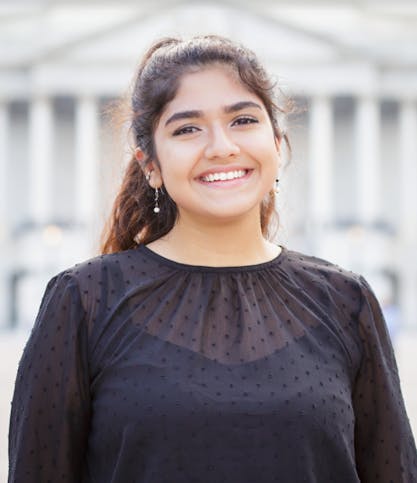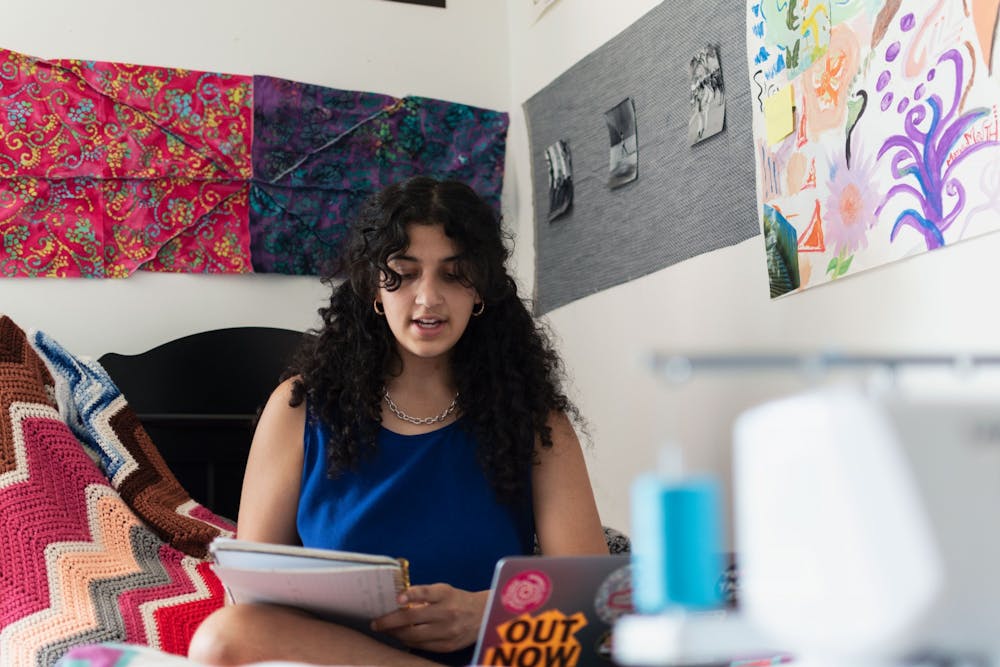Editor's Note, correction and clarification: This article appeared in The Eagle's October 2020 virtual print edition. It has been corrected with the proper spelling of Alexandra Weed’s name and clarified to state that the Panhellenic Council recruitment registration fee was waived until the end of the year.
After allegations of racism, colorism and sexual assault in the social Greek life community at American University surfaced this summer, many students disaffiliated from sororities and fraternities on campus, with women of color speaking out about the issues they faced while involved in the majority- white organizations.
Beginning in the summer, social media posts exposing racism and sexual assault allegations on multiple Instagram pages circulated throughout the student body. Many posts said social Greek life was responsible for perpetuating rape culture and racism on campus, with students sharing their allegations anonymously.
Students on social media pressured people within social Greek life to take action, which resulted in the disaffiliation of all members of the Delta Tau Delta fraternity chapter at AU and the resignations of all executive board members of the Alpha Xi Delta AU fraternity chapter.
Social Greek life has historically been majority white at AU and at other predominantly white institutions. Some students of color find community within the organizations represented in the Intercultural Greek Collective (IGC). Cultural clubs and organizations are also available for students to find community.
The police and citizen killings of George Floyd, Breonna Taylor, Ahmaud Arbery and many other Black Americans led to an eruption of protests throughout the summer. They also led to a reckoning with racism for institutions across the country, including for historically white social Greek organizations.
Many women of color, who were once a part of these organizations, said being in an environment where they did not feel welcome was toxic. The following stories from women of color are not a full representation of AU community members who say they have been harmed by social Greek life, but are rather a sample of voices who have chosen to speak out. Multiple members have claimed to face homophobia, transphobia and anti-Black racism as well.
In fall 2019, now-junior Ruby Avila chose to disaffiliate from Alpha Chi Omega, a women’s fraternity, due to a lack of diversity and financial aid within social Greek life. Avila said she joined the organization her freshman year to make new friends, but soon felt there was not a place for her.“No one looked like me, no one had the financial status like me, and the people who did, I became friends with them, but they quickly dropped as well,” Avila said.
Alpha Chi Omega chapter President Alexandra Weed wrote in an email to The Eagle that the chapter has created leadership positions focused on DEI efforts.
“Our hope is that all members feel welcomed and valued as a part of their experience and we work to maintain inclusion and equity in all that we do,” Weed wrote. “These positions are responsible for promoting an inclusive environment through educational events, presentations, and workshops for both members and prospective members."
Weed added that the chapter offers grants and scholarships, which can support members with financial need.
Panhellenic and Interfraternity Council (IFC) organizations require members to pay dues each semester. While some offer scholarships, financial aid for college expenses cannot cover dues.
The Panhellenic Council recruitment registration fee was waived until the end of the year, according to Travis Roberts, assistant director of Fraternity and Sorority Life at AU.
"After this, and until registration closes, they are only charging $5, which is the amount we get charged to use the software system," Roberts wrote in an email to The Eagle.
Affordability and representation issues also caused senior Muskan Kaur to leave Alpha Xi Delta, a women’s fraternity, in fall 2019. Kaur, who is a founding member and director of the Abolish Panhellenic + IFC group at AU, rushed during the spring of her freshman year. After rushing, Kaur later felt a growing sense of disbelonging.
“I saw a lot of colorism,” Kaur said. “My big [sorority sister] was a darker shade of brown than me and was treated so differently.”
After reflecting on what she saw and experienced in her own organization, she said that sororities did not represent Black women or women with darker skin. Realizing that she and others were complicit, she co-founded the Abolish Panhellenic + IFC chapter at AU.
The chapter’s mission to abolish social Greek life at AU began with a petition that garnered thousands of signatures overnight. Students across the country also started chapters at their own universities.
The group says that reform is not enough to rid social Greek organizations of incidents of racism, homophobia, transphobia, elitism and sexual violence.
“People have reached out to me and said that I was a woman of color empowered by her sorority but I just got lucky while others were not given that opportunity,” Kaur said. “No one should have to get lucky to feel empowered.”
Kennedy Political Union Director Amrutha Chatty, a senior who disaffiliated from Phi Sigma Sigma this past summer, said that she entered her sorority leadership ready to make reforms from the top-down; however, she had her own experiences with being misnamed.
Chatty, who is South Asian, said that with a handful of other South Asian members in the sorority, there were multiple instances when she was called the wrong name and mixed up with another South Asian member, even after being a member for multiple years and rising to the role of an executive board member.
The chapter did not respond for comment at the time of publication.
“In general, the entire system of Greek life is built to marginalize people and keep people of color out,” Chatty said.

Simrnjit Seerha, a senior, also disaffiliated from Phi Sigma Sigma over the summer after hearing multiple stories regarding the culture of social Greek life on social media coupled with her own experiences.
“My initial uncomfortability stemmed from being a first-generation American college student and also a person of color, having a different religion, a different culture, even a different first language," Seerha said. “I was putting so much effort into connecting with people, more so than white members.”
Seerha said that after joining the sorority, she was determined to make a change from within by joining the Diversity, Equity and Inclusion council and e-board.
“I really wanted to change the structure, but it was beyond my capacity,” Seerha said. “While a lot of people genuinely wanted to make change, it was more performative than not.”
Seerha and Chatty said their decision to leave Phi Sigma Sigma was made clear after they saw an anonymous post alleging that one of the organization’s members, former Panhellenic Council President Bella Dixon Smith, used a racist slur at a fraternity party. After apologizing on social media, but refusing to step down, she ultimately resigned the next day.
Dixon Smith said she could not be interviewed by The Eagle due to National Panhellenic Conference guidelines. The conference did not respond for comment at the time of publication.
“The fact that the Panhellenic president can do that and face no consequences goes to show what a deep rooted issue that we have,” Seerha said.
In an email to The Eagle, Acting Panhellenic President Anna Waldman said none of the seven Panhellenic organizations at AU are participating in recruitment for the fall 2020 semester. Formal spring recruitment will be held entirely online.

Senior Prachi Jhawar said she disaffiliated from sorority Sigma Kappa after one semester. She felt that Greek life was contributing to a culture of harm on campus and that leaving was the only option.
"I felt like I was constantly bringing up this conversation about racism and others would acknowledge it but not really move forward with it,” Jhawar said of her interactions with nationals.
Sigma Kappa nationals did not respond to The Eagle’s request for comments by time of publication.
Kaur said since beginning the Abolish Panhellenic + IFC chapter, the coalition has gained national attention from students, former Greek alumni and parents. She said various nonprofits have contacted the group to offer resources and assistance.
The coalition is currently running social media campaigns to raise awareness about the harms caused by Greek life. They recently held a week of action in which they encouraged students to email administrators and post to social media in support of the movement.
However, for sorority or fraternity chapters to disband their charter, official documentation that recognizes a university chapter, must be revoked by the University or nationals must decide to abolish it. If all members of a sorority or fraternity leave the chapter it can still be revived by Nationals at any moment.
Despite these barriers, some students continue to push for drastic measures to address the harm faced by women of color within social Greek life organizations.
“At a school like AU which prides itself on having spaces that are inclusive for everyone, social Greek life should not exist,” Jhawar said. “It’s not about the chapter itself or the people itself, it’s about the power and privilege and this system for upholding social and economic power for some people and suppressing it for others."





